Jan 31st 2022
Puppies: The First Four Weeks
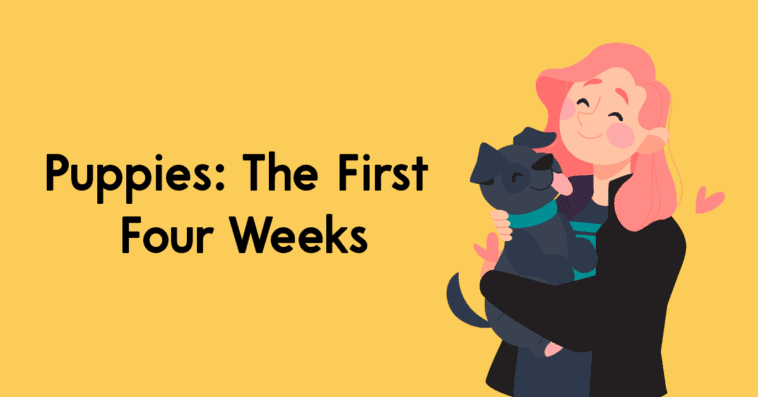
The ultimate guide to the first month of living with a puppy
If you were lucky enough to have a dog when you were growing up, then you will remember the day the puppy came home. You remember how tiny and cute they looked. Perhaps how naughty they were at first.
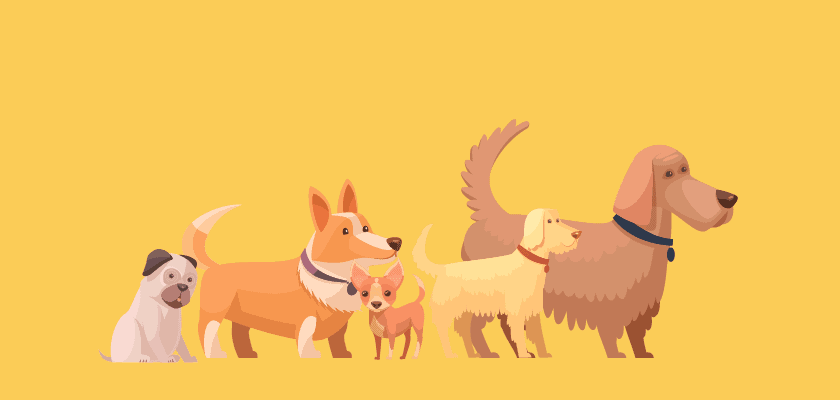
Your new puppy is going to bring that joy back into your life and will grow up to be an amazing companion for you and your family.
Puppies, similarly to children, require someone to keep an eye on them and teach them right and wrong. This is where many people start to panic about how to raise a puppy. But don’t worry, you have come to the right place.
In this guide, you will learn everything you need to know about raising a puppy safely and in a way that helps them to grow up to be a well-behaved, kind, and loving dog.
Table of Contents [hide]
- How To Prepare For A New Puppy
- The Puppy’s Development in the First 4 Weeks
- Beginner Tips For A New Puppy
- Do’s & Don’ts For New A Puppy
- Summary
How To Prepare For A New Puppy
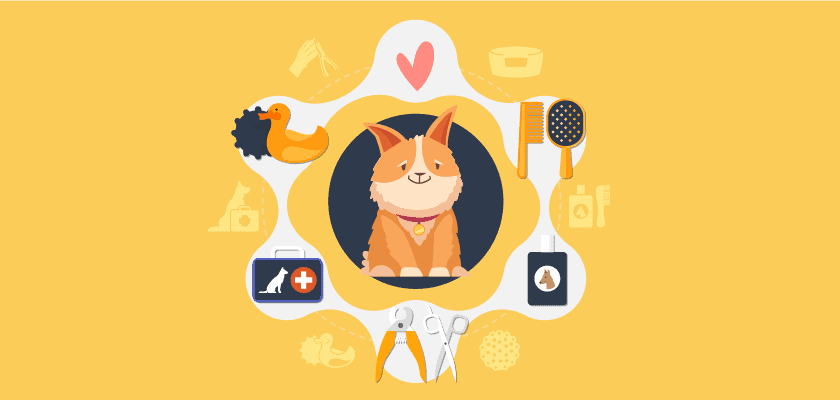
Bringing a puppy into your home can be as impactful as bringing home a newborn baby – you will need to puppy-proof the home and you will probably lose some sleep. There is a lot of work that you will need to do before the puppy arrives.
In this section, we are going to talk you through everything you will need to do to get your home ready for your new puppy.
One of the most important things to remember is that your puppy will be learning from you and your family. And they can only learn if you are all consistent. Perhaps, you should all work through this section together.
Make The House ‘Puppy Proof’
Step one of preparing for a puppy is the process of puppy-proofing.
If you have never had a puppy before then you might not be prepared for how destructive they can be. It is your job as their owner to make sure that there is nothing within their reach that could hurt your puppy. You can also be a little bit selfish and move anything you don’t want to get damaged out of the reach of your puppy.
Here are 10 things you should do to puppy-proof your home:
- Choose one room for the puppy to spend their first week or two in – we recommend choosing a living room with easy access to outside, this will help with potty training and it will make the puppy feel more involved in your life.
- Weigh down the lids of your trash cans, or get cans with peddling lids – lots of our trash is toxic to dogs, and well, trash smells really tasty and exciting to puppies. It’s a bad combination.
- Move all electrical cords out of the range of your puppy – chewing through a live wire can kill a puppy. Keep any live cords well away from them
- Remove anything with batteries in it out of the range of the puppy – puppies are very good at getting into things they shouldn’t and you do not want them to get hold of a battery
- Do not keep your shoes or your bags on the floor – these items smell like you and it is going to make your puppy much more interested in them. The linings in these items can sometimes be toxic
- Move any houseplants out of the puppy’s room – many houseplants are toxic to small animals, cats, and dogs.
- Cover any sharp edges or corners – just like toddlers, puppies like to run with abandon and will sometimes bump into things, make sure there is nothing sharp for them to run into.
- Keep your puppy away from the stairs – there are many breeds of dogs that have vulnerable hips. Letting your puppy climb the stairs or jump off things can cause permanent damage to their hips and legs.
- Remove any food, alcohol, or drugs (both recreational and medical) from the room – as we mentioned, puppies have a habit of getting into things they shouldn’t. All of the items we just mentioned can make your puppies very ill if they ingest them
- Make a safe space just for your puppy – your puppy is going to be a little stressed during their first week in your home. You will want to make a cozy, dark space for them to hide in when they feel like it. We recommend putting a blanket over a cage and tucking it between two pieces of furniture.
Gather a Puppy Survival Kit
The more things you buy and put in the puppy survival kit before your puppy arrives the easier your first month together will be.
Here is a list of things you will need when your puppy arrives:
- Food bowl and water bowl
- Food (appropriate for the puppy’s age and breed)
- Harness, lead, and collar
- Flashing collar for dark nights
- Toys (both hard and soft)
- Treats
- A cage for their safe space
- House training pads
- Anti-bacterial wipes
- Carpet cleaner
- Dog shampoo
- Flea and worm treatment
- Combs
- A dog towel
Get The Family On The Same Page
Your puppy will need consistency to learn.
If you tell your puppy it can’t sit on the sofa, but your partner lets it sit on the sofa when you’re out. Then the puppy will not know what it is meant to do and will just do what it wants.
This is why it is important to establish the house rules for the puppy before it arrives. This will make it easier for both you and your puppy.
Create A Detailed Schedule
Your final step in preparing for your puppy is making a plan.
You should write down when you are receiving your puppy, when their vaccinations are going to happen, note down any upcoming vet appointments, and any other important events in their life.
Then you are going to want to sit down with your family and make a rough plan for the puppy’s day. This should include who is going to feed them and when, when they are going to be taken out for walks (when they are old enough) and who is going to take them, and who is going to be responsible for their day-to-day training.
Puppies can be unpredictable and you shouldn’t set long term training goals for them, as they all learn at different paces, but you can plan in the short term.
The Puppy’s Development in the First 4 Weeks
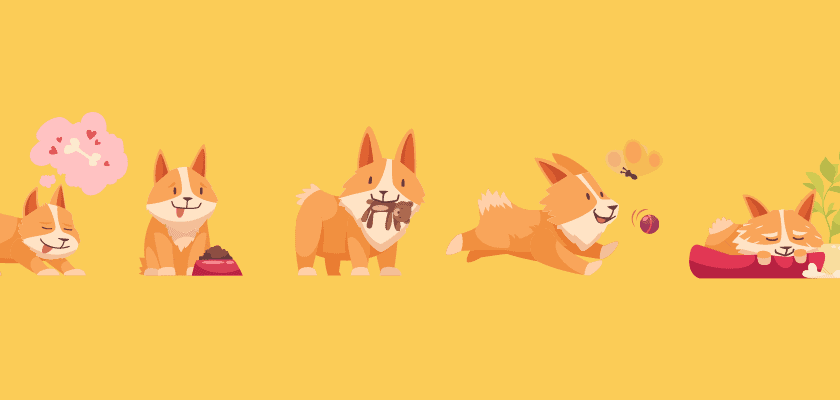
You will not have your puppy for the first 4 weeks of its life. You should expect your puppy to be between 8-12 weeks – never earlier. Vets believe that leaving puppies with the rest of their litter until they are 12 weeks old will be really beneficial for them.
If you are curious about what the first 4 weeks of a puppy’s life look like, you can find more out here.
We are going to talk you through everything you should expect from your first 4 weeks with your new family member. This will consist of the 12-16 week period of their lives. They are going to change a lot, so be prepared.
Physical Development
12 weeks is the sweet spot where everything starts to come together for puppies. They have better control over their bowels.
They can sleep through the night without having to go to the toilet and they get very good at knowing when they need to go. Rather than being taken by surprise, as younger puppies are.
The 12-16 week period is prime teething time. So, make sure everything that is chewable is out of reach, and get them a selection of toys – some that are soft and some that are harder.
During this time your puppy may have red and bleeding gums, this is natural. You may even find a few baby teeth lying around the house. By the end of the 16th week, their teething urges should have calmed down. By the time they reach 21 weeks, it should be completely over.
Behavior Changes
Socializing your dog during the first month can be a little tricky, they will have not had their full set of vaccinations, so they will not be able to go on walks and socialize or spend time with unknown dogs (and other animals). But it is really important that you socialize them as safely as you can.
How can you do this? Well, you can invite friends and family over to visit one at a time. You can also invite dogs that you know over for a play date. If you know someone whose dog is the same breed as your own puppy, this can be extremely beneficial. Your dog can get to know a new dog that looks like its family member.
You might want to put them in a backpack and wear them on your front. Then take them on a walk around the neighborhood and places where they will be walking in the future. They will get used to the sights, sounds, and smells while feeling safe because they are so close to you.
Between 12-16 weeks, your puppy is moving from being the equivalent of a young child to being a teenager. They may be a little unruly during this time and temporarily develop an attitude. This is part of growing up for them.
Health And Care
By the time you take your puppy home, they should have had their first vaccination, if not their second as well. Their final vaccinations will be done at around 16 weeks. After this point they will be allowed to go outside and meet dogs they do not know.
Your puppy will need checkups at 12 weeks and at 16 weeks. After that, they will not need checkups until 1 year. We recommend that you insure your puppy as soon as you get them. Puppies can get themselves into accidents or eat things they shouldn’t and you want to make sure you can get them the best treatment possible.
Food & Nutrition
Puppies need to eat different food than fully grown dogs, so if you have multiple dogs at home then you will need to feed your puppy differently from the rest.
The good news is that most dog food manufacturers have developed food made especially for puppies. So, you don’t have to work anything out except for what size portion you should feed your puppy. Look out for biscuits and/or wet food labeled for 12+ weeks and for growing dogs.
When they first arrive at your home, your puppy might be too nervous to eat a lot. Don’t panic, just leave their food out in a place that is easy for them to get to and let them eat at their own pace.
Keep an eye on how much your puppy is eating, eating a lot more or a lot less can be a sign that your puppy is unwell. If you are worried, take them down to the vets as soon as you can.
Training And Socialization
Training your puppy can be a rewarding and frustrating experience for everyone involved.
The younger your puppy is, the harder they will find it to concentrate. When you are trying to train your puppy you should remove as many distractions from the room as possible. Keep one toy with you so you can use it as bribery.
Puppies respond well to rewards, rather than punishment. So, have a pocketful of treats on hand when you start your training sessions. You should also have treats on hand so you can reward the puppy for going to the toilet in the right place. Try to reward them within 10 seconds of the action.
If you have young children in your family then you should invite them to help you with the training. This will help the puppy to realize they have to listen to the younger members of the family as well as the adults of the family.
Beginner Tips For A New Puppy
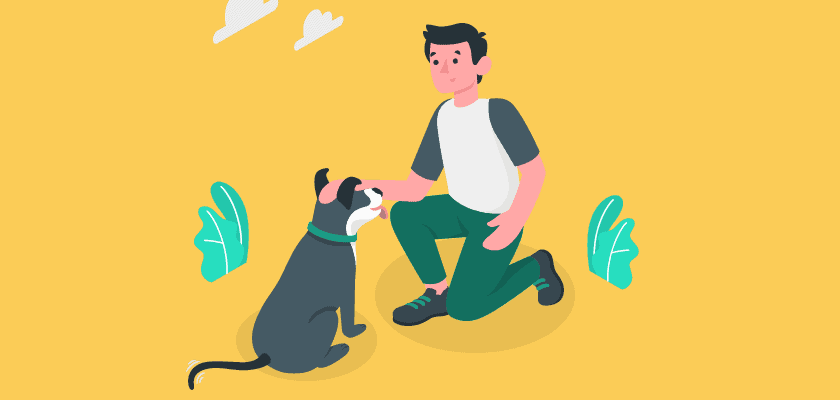
Now that you have learned how to prepare for your puppy’s arrival and have an idea of what those 4 weeks are going to look like, we want to give you some tips that will make that first month easier, happier, and more fun for both you and your puppy.
Many Toilet Accidents Are To Be Expected, So Prepare For Them
It takes the average puppy two months to become fully house trained. So, expect accidents during the first month. When they happen, be kind to the puppy. You will make more of an impact if you praise them when they go in the right place rather than shouting at them when they go in the wrong one.
You should also be prepared for the fact that puppies like to eat what they shouldn’t and that some of these items won’t agree with their stomachs. A lot of the time, the process of having a bad stomach will teach the puppy not to eat that thing again – so, there is no need for you to punish them.
Don’t Overwhelm The Puppy With Many Visitors
When you are introducing your puppy to the new world, you have to strike a fine balance between exposing them to new things, people, and dogs – and not overwhelming them.
When people find out that you have a new puppy they are going to want to come and visit it. Sometimes, you will have to politely say no, because you don’t want the puppy to get too overwhelmed by people.
For the first month that your puppy is with you, you might have to hold any parties or big events that you would usually have in your home in an event space or at a restaurant. Make sure you have someone at home keeping an eye on your puppy while you do this.
Start Training Your Puppy Early
When should you start training your puppy? Well, it is never too early to start training your puppy. But there is a sweet spot where they have enough attention span to sit through a 10-minute training session.
You can start training your puppy the day they arrive if you like. It might be a good distraction for them, as a lot is changing around them. At this age, you may only be able to get them to train for a minute at a time. But this will add up.
However, when your puppy hits around 11-13 weeks, they will be able to train for longer. Once they have had all their vaccinations, you can take them out to a puppy training class.
Focus On Achieving Trust With Your Puppy
We cannot force dogs to trust us, instead, we have to give them space and allow them to make their own decisions. This can make a lot of people nervous as it takes time and many people are paranoid that their dog won’t want to trust them.
The good news for us humans is that dogs are loving creatures and they are more than happy to put their trust in us. Even abused rescue dogs can learn to trust again.
The best things you can do with your puppy are:
- Give them a safe space (see next section)
- Don’t chase them around and pick them up, let them come to you
- If they are scared and they want to be around you, let them, even if it is inconvenient for you
Have Quiet Spots For The Puppy To Sleep
When a puppy moves to their new home, they will be leaving behind the only building they know, the only people they know, and most likely the rest of their litter. They will then be taken to this new place where everything smells different with new people and noises.
To make this process easier for your puppy, create a quiet (and dark if you can) place where they can hide if they are scared. Their natural instincts will be telling them to hide at first. Let them do that, they will soon realize they are safe.
Use Baby Gates
When you have a new puppy, baby gates are going to be your best friends.
You shouldn’t introduce your new puppy to the whole house at once. They will find it less stressful if they are kept in one room. They can get used to this room being their new den and then start to explore when they are feeling more comfortable.
Baby gates will help you to keep your puppy in one location.
When puppies’ hips are still developing, it is really important that you don’t let them climb the stairs – this is crucial for bigger breeds like Labradors. You will need to put a baby gate at the bottom of any staircases.
Focus On Socializing
There is a fine line when it comes to socializing your dog. You do want them to be able to meet new people and other dogs. But you don’t want them to get overwhelmed.
Try introducing your dog to new people one at a time and have them come to visit you, or travel to their house.
You can do the same with other dogs. If the dog is very calm and well-behaved, you could take your puppy to visit the other dog, and this will help them to learn dog behavior patterns. These patterns will be very important for them when they start going on walks.
Do’s & Don’ts For New A Puppy
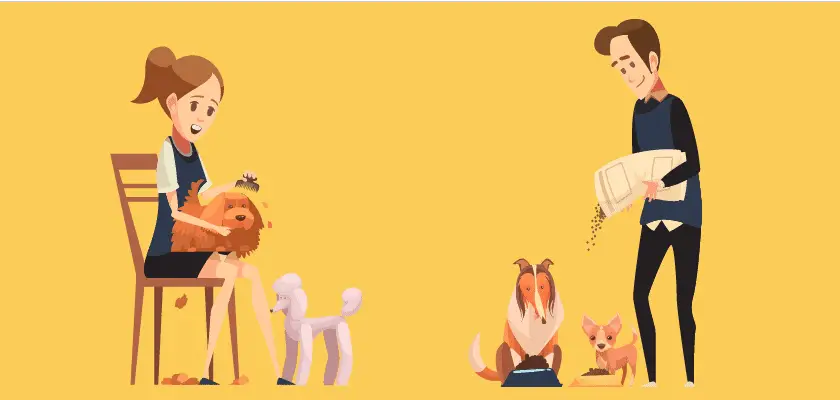
Before we leave you, we want to give you a Do’s and Don’ts list that will help you get through the first month with your puppy.
This first month can be tiring and you will have to spend a lot of time keeping an eye on your puppy. But it will be worth it because if you get most of it right now, your puppy will be on its way to being a kind and well-rounded dog. And you will have yourself a best friend for life.
Good luck!
Do’s
# 1 – Find Out How Dogs Learn
In the last 50 years, psychologists have discovered that every person learns in a different way. Teachers are trained to help each of their students in the best way possible for their learning style.
You probably won’t be surprised to hear that the same goes for dogs. Take some time to learn the best way to teach your puppy’s breed and the process will be a lot smoother.
#2 – Start Training Early
The earlier you can start teaching and training your puppy the better. They are more likely to retain lessons they have learned earlier in life.
You may not be able to take them to puppy training classes in their first month with you (because they might not be able to go outside), but you can teach them a few things in your living room. ‘Sit‘ and ‘Stay’ are very useful skills to start with.
#3 – Distract Them If They Are Doing Something You Wouldn’t Want An Adult Dog To Do
When puppies are really young, they don’t understand when you ask them to stop doing something. The whole world is new and exciting for them and they will occasionally (very often) do something you don’t want them to do.
Instead of shouting at your puppy or pulling your puppy away from what they are doing – distract them. If you shout at them or move them around they might think that you are playing a game with them. They may then do the forbidden activity next time they want to play to get your attention.
There are many different ways you can distract your puppy. You could pick them up and give them a cuddle. You could get out one of their favorite toys and play with them. You could start doing one of their training exercises and get them to practice something like sitting or lying down.
#4 – Introduce Them To New Objects
The more of the world you can introduce your puppy to the better. The more new items, smells, and people they encounter at home, the better prepared they will be for surprises in the real world.
Why do we want our puppies to learn how to cope with surprises?
Well, sometimes when puppies are surprised they can start to panic and get upset. When this happens they could accidentally hurt themselves on their lead or do something dangerous like run out into the road.
We want to help them get used to unknown objects and avoid them hurting themselves out of fear.
#5- Look Into Local Dog Classes
Once your puppy has had all their vaccinations then you should take them out to a local puppy training class.
These classes will offer you a great opportunity to learn tips and tricks from a professional dog trainer and meet other people in the area with a puppy.
Your dog will learn all their basic skills in the best way possible and they will be able to socialize with new dogs.
Puppy training classes are one of the cutest things you will ever see – you don’t want to miss out on them.
Don’ts
#1 – Shout At Or Punish The Puppy When They Make A Mistake
Our first Don’t is to not shout at your puppy. Shouting at a puppy has a really negative effect on them. It can cause them to develop depression and can make them naughtier.
The studies have shown that dogs respond much better to praise than they do to being told off. It is better to distract them when they are misbehaving and then praise them when they do anything good than it is to shout at them.
#2 – Wake Them Up To Play
Sleep is one of the most important elements of a young puppy’s life. If they need to sleep they will, and if they are asleep it is because they need to be.
You want your puppy to get enough sleep so that they can grow up healthily, the best thing you can do is to let the sleeping puppy lie.
The puppy may be out of sync with your family when they first arrive, but they don’t know that. So, be patient with them and let them work to their own schedule. As they get older they will fit in with the rest of the family.
#3 – Allow People To Handle The Puppy Roughly
It is really important that you make sure people handle the puppy gently. There are two reasons for this, (1) they may get hurt, and (2) they may start to think that rough play with people is acceptable. That second one is particularly dangerous if you have children in the house.
It can be tempting for people to roughhouse a puppy because they still bite when they play and they enjoy the attention – but the situation is best avoided.
#4 – Have Expectations Too High
Remember that puppies are young, they’re still learning. The world can be scary, overwhelming, and confusing for them. In their first month with you, they will have a lot to learn.
However, there should be no schedule for them to meet. Some puppies practically potty train themselves, while others take weeks. Some puppies learn to walk to heel within days, and some never really learn how to do it.
The best way to raise a well-rounded, loving dog is to be kind and consistent with it. Be considerate and patient with them.
Summary
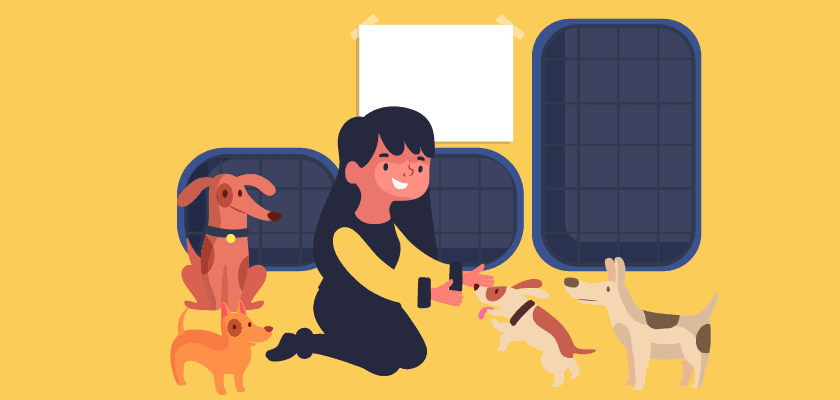
Having a puppy join your family is an amazing moment and one you will all remember for the rest of your lives. But this new family member does come with some responsibilities and it will be your job to raise them.
When you are training and getting to know your new puppy remember that they are young and that they are still learning how the world works. Be patient with them, do not shout at them, and be consistent with their discipline.
You will have to work together as a household to make sure that the puppy understands what is expected of them. But, don’t forget to play with the puppy, have fun with them, and get to know your new best friend.
| Chelsea Price | Outreach Executive
C: Dogs n Stuff |
